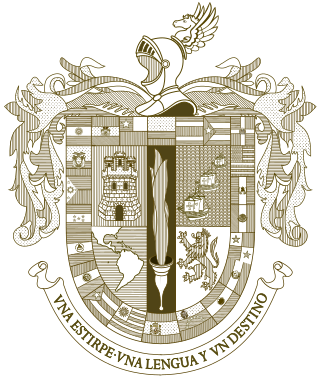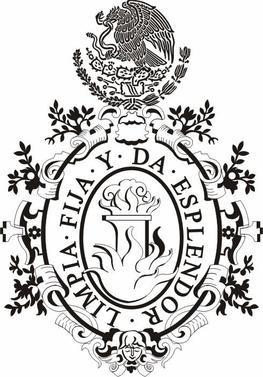Related Research Articles

The Royal Spanish Academy is Spain's official royal institution with a mission to ensure the stability of the Spanish language. It is based in Madrid, Spain, and is affiliated with national language academies in 22 other Hispanophone nations through the Association of Academies of the Spanish Language. The RAE's emblem is a fiery crucible, and its motto is Limpia, fija y da esplendor.

The Association of Academies of the Spanish Language is an entity whose end is to work for the unity, integrity, and growth of the Spanish language. It was created in Mexico in 1951 and represents the union of all the separate academies in the Spanish-speaking world. The association publishes reference works on the Spanish language and commemorative editions of Hispanic literature, among other publications.
Pedro Shimose Kawamura is a poet, journalist, professor and essayist from Bolivia. He has been based in Madrid, Spain since 1971. Shimose is considered one of Bolivia's most notable poets.
The Philippine Academy of the Spanish Language is the language regulator for Philippine Spanish, the variant of the Spanish language spoken in the Philippines. It is one of two Spanish language regulators located in countries where the language does not have an official status nationwide, the other being the North American Academy of the Spanish Language in the United States.

Don Francisco Javier del Granado y Granado, was a poet laureate and favorite son of Bolivia.
The High Academy of the Quechua Language, or AMLQ, is a Peruvian organization dedicated to the teaching, promotion, and dissemination of the Quechua language.
The Academia Chilena de la Lengua is an association of academics and experts on the use of the Spanish language in Chile. It is a member of the Association of Academies of the Spanish Language and is a part of the Instituto de Chile.
The North American Academy of the Spanish Language is an institution made up of philologists of the Spanish language who live and work in the United States, including writers, poets, professors, educators and experts in the language itself. Its mission is to support and promote the study and correct usage of Spanish in the United States of America. The Academia, established in New York City in 1973, is a corresponding member of the Real Academia Española and a member of the Asociación de Academias de la Lengua Española, in Madrid, Spain.

The Academia Mexicana de la Lengua is the correspondent academy in Mexico of the Royal Spanish Academy. It was founded in Mexico City on 11 September 1875 and, like the other academies, has the principal function of working to ensure the purity of the Spanish language. Academy members have included many of the leading figures in Mexican letters, including philologists, grammarians, philosophers, novelists, poets, historians and humanists.

The Academia Colombiana de la Lengua is an association of academics and experts on the use of the Spanish language in Colombia. It is based in Bogotá, Colombia's capital, and is a member of the Association of Spanish Language Academies.
The Academia Ecuatoriana de la Lengua is an association of academics and experts on the use of the Spanish language in Ecuador.
The Academia Salvadoreña de la Lengua is an association of academics and experts on the use of the Spanish language in El Salvador. It was founded in San Salvador on October 19, 1876. It is a member of the Association of Spanish Language Academies.

The Academia Venezolana de la Lengua is an association of academics and experts on Venezuelan Spanish, the variant of the Spanish language in Venezuela. It was founded in Caracas on July 26, 1883. It is a member of the Association of Spanish Language Academies.
The Academia Guatemalteca de la Lengua is an association of academics and experts on the use of the Spanish language in Guatemala. It was founded on June 30, 1887. It is a member of the Association of Spanish Language Academies.
The Academia Panameña de la Lengua is an association of academics and experts on the use of the Spanish language in Panama. It was founded in Panama City on August 9, 1926. Both former presidents Ricardo Joaquín Alfaro Jované and Ernesto de la Guardia were members of the academy. It is a member of the Association of Spanish Language Academies.
The Academia Paraguaya de la Lengua Española is an association of academics and experts on the use of the Spanish language in Paraguay. It was founded on June 30, 1927. It is a member of the Association of Spanish Language Academies.
The Academia Hondureña de la Lengua is an association of academics and experts on the use of the Spanish language in Honduras. It was founded in Tegucigalpa on December 28, 1948. It is a member of the Association of Spanish Language Academies.

The Academia Puertorriqueña de la Lengua Española is an association of academics and experts on the use of the Spanish language in Puerto Rico. It was founded in San Juan on January 28, 1955. It is a member of the Association of Spanish Language Academies.

The Equatoguinean Academy of the Spanish Language is an association of academics and experts on the use of the Spanish language in Equatorial Guinea, a republic in Central Africa in which Spanish is the national official language. Equatoguinean Spanish is the particular variety of Spanish spoken in the country. Since 19 March 2016, Equatorial Guinea has been a member of the Association of Spanish Language Academies.

Elsa Nadezhda Bravo Cladera is a Bolivian linguist, researcher and writer. She is a Doctor of Philosophy in Romance Languages from the University of Uppsala. She is "Académica de número" of the Academia Boliviana de la Lengua.
References
- ↑ "Academia Boliviana de la Lengua". www.asale.org (in Spanish). Retrieved 2020-08-05.
